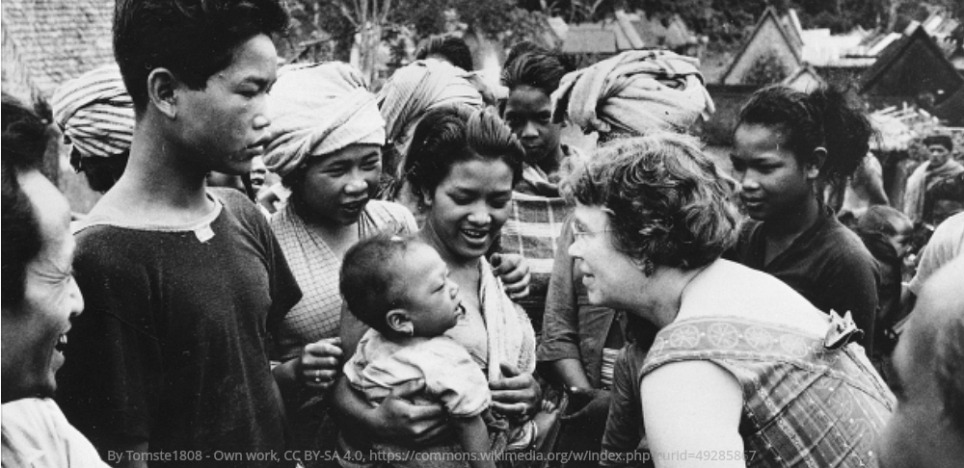Margaret Mead, born in Philadelphia on December 16, 1901, became the famous anthropologist of her time, ushering into public awareness the need for cross-cultural perspective and respect for humans' capacity to change. She came from a family of social scientists, roots which influenced her decision to study psychology at Barnard and earn her doctorate in anthropology at Columbia University.
Her first field trip after graduation took her to Samoa, where she studied the importance of culture in shaping adolescents, showing that it played at least as much of a part in their development as biology did. Her book Coming of Age in Samoa (1928) became a bestseller and helped people understand that, as her advisor Franz Boas put it, "Courtesy, modesty, good manners, conformity to definite ethical standards are universal, but what constitutes courtesy, modesty, very good manners, and definite ethical standards is not universal. It is instructive to know that standards differ in the most unexpected ways." Her studies continued to deepen as she completed 24 field trips among six South Pacific peoples.
Dr. Mead's later works, including Male and Female (1949) and Growth and Culture (1951), showed how social conditioning rather than heredity shaped personality characteristics. Her understanding of interconnections led her to speak out on a variety of social issues. She wrote a column for Redbook magazine and was in demand to give lectures and interviews.
Dr. Mead taught at Columbia, but her major appointment was with the American Museum of Natural History, where she served in a variety of curator roles from 1926 - 1978, the year of her death. When she was 72, she was elected president of the American Association for the Advancement of Science. Posthumously, she received the Presidential Medal of Freedom, the highest civilian honor in the United States.
To Name This Day . . .
 Quotes
Quotes
Which one of the following quotes from Dr. Mead most captures your attention? In memory or in writing, let it travel with you today and help shape your perceptions.
"As the traveler who has once been from home is wiser than he who has never left his own doorstep, so a knowledge of one other culture should sharpen our ability to scrutinize more steadily, to appreciate more lovingly, our own."
— from Coming of Age in Samoa
"Human nature is almost unbelievably malleable, responding accurately and contrastingly to contrasting cultural conditions."
— from Sex and Temperament in Three Primitive Societies
"It is utterly false and cruelly arbitrary ... to put all the play and learning into childhood, all the work into middle age, and all the regrets into old age."
— as quoted in Teacher's Treasury of Stories for Every Occasion (1958) by Millard Dale Baughman
"The first step in the direction of a world rule of law is the recognition that peace no longer is an unobtainable ideal but a necessary condition of continued human existence. But to take even this step we must return to a calm and responsible frame of mind in which we can face the long patient tasks ahead."
— from "Are Shelters the Answer?" in The New York Times Magazine (November 26, 1961)
"If you associate enough with older people who do enjoy their lives, who are not stored away in any golden ghettos, you will gain a sense of continuity and of the possibility for a full life."
— attributed to Mead in Mead Childhood Education Vol. 54 (1977) by Association for Childhood Education International
 Personal Exploration
Personal Exploration
In her 1972 book, Blackberry Winter, Dr. Mead wrote:
"I think it was my grandmother who gave me my ease in being a woman. She was unquestionably feminine — small and dainty and pretty and wholly without masculine protest or feminist aggrievement. She had gone to college when this was a very unusual thing for a girl to do, she had a very firm grasp of anything she paid attention to, she had married and had a child, and she a career of her own. All this was true of my mother as well. But my mother was filled with passionate resentment about the condition of women, as perhaps my grandmother might have been had my grandfather lived and had she borne five children and had little opportunity to use her special gifts and training. As it was, the two women I knew best were mothers and had professional training. So I had no reason to doubt that brains were suitable for a woman. And as I had my father's kind of mind — which was also his mother's — I learned that the mind is not sex-typed."
Draw a "family tree" of three or four older adults who have influenced or mentored you. They can be relatives, but they do not need to be. Write their names across the top of a page, allow some space, and then put yours halfway down the page.
In the space beneath their names, write a few sentences about the roles and responsibilities they took on and how they felt about those roles and responsibilities. When you have finished with all four of them, use the space beneath your name to write about your own roles and responsibilities and how you feel. Allow for nuances and honesty: For instance, it is possible to feel both rebellious and accepting at the same time, if you experience competing priorities.
